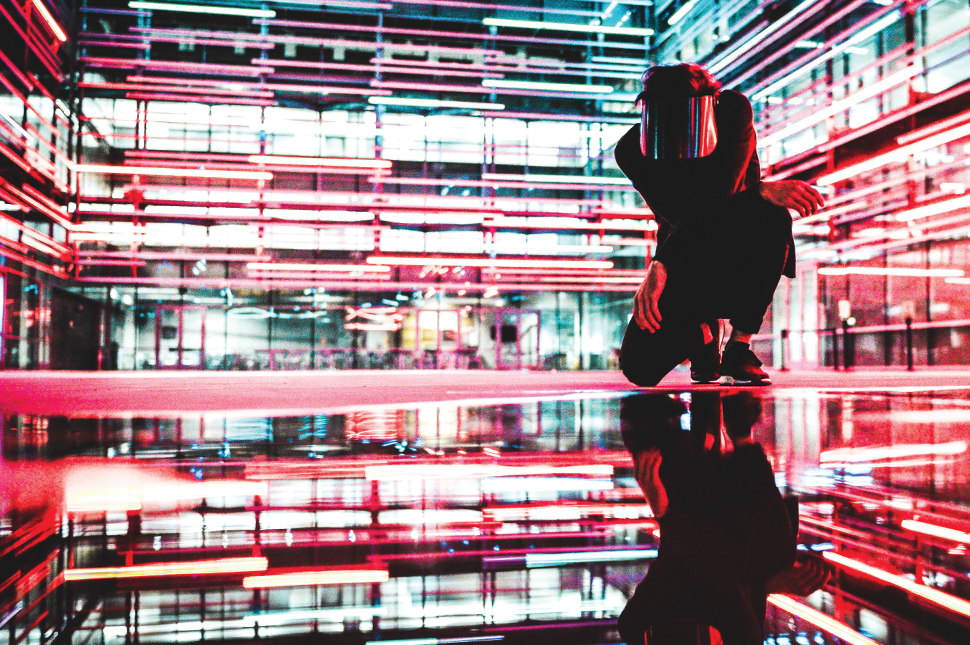Artificial Humanity
Gabriele Schwab
Comparative Literature and Anthropology
UC Irvine
Participants
Morana Alac
Communication
UC San Diego
Long Bui
Global and International Studies
UC Irvine
Pheng Cheah
Rhetoric
UC Berkeley
Renee Fox
Literature
UC Santa Cruz
Annie McClanahan
English
UC Irvine
Erin McElroy
AI Now Institute
New York University
Chikako Takeshita
Gender and Sexuality Studies
UC Riverside
The Spring 2020 Residential Research Group on Artificial Humanity brings together a team of eight scholars and researchers to explore questions around the increasingly porous boundaries of humanity and the digital in a networked world. We live at a time when robots can recognize human faces and interpret expressions, computers can transcribe human speech and analyze affective tone, and algorithms decide what we read, how we consume, and whom we meet. Technologies that were unthinkable 20 years ago are now portable, wearable, even implantable; and automation has transformed the landscape of human labor in just a few generations. What does it mean to be human in a post-everything age? Are we posthuman yet? What are the limits of the human in the face of rapid technological progress that simultaneously helps and threatens?
At a moment when teachers, researchers, and students are all re-navigating relationships in the classroom and beyond through virtually-connected worlds in the wake of the COVID-19 pandemic, the Residential Research Group on Artificial Humanity is also an experiment in how to maintain scholarly engagement amid physical isolation. As they consider the boundaries between the human and the digital, RRG members will also be working out, in real time, human collaboration across virtual networks in the dramatically shifted conditions of our present.
As part of their work, the RRG members are exploring how the new forms of physical and social distancing imposed by the pandemic impact the very notion of “artificial humanity.” They envision using the “artificial” situation imposed on them as an “experimental system” (Hans-Jörg Rheinberger) that facilitates hitherto unfamiliar encounters, forms of collaboration and, perhaps even more generally, subjectivity, culture, and life. The participants hope that their meetings in virtual space will become conducive to the emergence of what Rheinberger calls “epistemic things,” that is, things that “embody what one does not yet know.”
Meet the RRG Members
As they connect via videoconference across the state of California and beyond, the RRG on Artificial Humanity is experimenting with a virtual form of knowledge production that presents new challenges and possibilities for exploring the line between the artificial and the human amid the conditions of our pandemic present. Here, the RRG members take a moment to introduce themselves and share how they’re approaching this new structure of research collaboration as well as what they hope will result from their work together this spring.
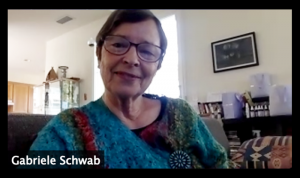 Gabriele Schwab (RRG Convener)
Gabriele Schwab (RRG Convener)
Distinguished Professor of Comparative Literature
UC Irvine
Gabriele holds appointments in the departments of Comparative Literature, Anthropology, English, and European Languages and Studies. She is the recipient of a Guggenheim Fellowship and a Heisenberg Fellowship. Her monographs in English include Imaginary Ethnographies: Literature, Subjectivity, Culture (2012, 2014 Choice Award for Best Academic Book); Haunting Legacies: Violent Histories and Transgenerational Trauma (2010); The Mirror and the Killer-Queen: Otherness in Literary Language (1996); and Subjects Without Selves: Transitional Texts in Modern Fiction (1994). Gabriele is also the editor of several collections, including Clones, Fakes and Posthumans: Cultures of Replication (2012, with Philomena Essed); Derrida, Deleuze, Psychoanalysis (2007), and Accelerating Possession: Global Futures of Property and Personhood (2006, with Bill Mauer). Her new monograph, Radioactive Ghosts, is in production with the University of Minnesota Press. In addition to these publications, Gabriele has also written numerous essays on cyborgs, clones, replacement humans, new animisms, phantasms of the mutant body, and transspecies reproduction, work she will draw on in the RRG on Artificial Humanity. She is currently working on a new book that explores trans-species encounters.
How are you navigating the experience of a virtual research collaboration with the RRG? What are the opportunities and challenges?
Our group started out with the best of energies to meet the challenge of a virtual collaborative research group in the most productive way possible. Unfortunately, it is not as easy as we imagined, and this in itself is an important lesson about the conditions and possibilities of “artificial humanity.” Meeting on Zoom deprives us of the most important elements that support creative synergies: regular meetings with coffee breaks, informal continuation of discussions between meetings, occasional dinners, energizing special events hosted for the campus community, perhaps even an excursion. It is hard to describe how these seemingly mundane things, or their loss, impact generative collaborative work. They are the very things that help groups grow together and generate intellectual engagement. At the beginning of our lockdown, I truly hoped that we could create a virtual equivalent of such an environment. I find sparks of it in our group discussions, but have come to realize that Zoom encounters are simply not enough. We also cannot ignore that the “artificial situation” has taken a toll on all of us, and, while our material conditions and ways of coping are very different, I believe we have learned a great deal about what at least some of us consider to be highly artificial forms of communication and collaboration.
Early on, our group decided to write about our experiences with the environments generated by the coronavirus that could link to our topic of “artificial humanity.” Six of us wrote pieces that we are reading and discussing during our Zoom meetings. Ideally, we envision publishing them, perhaps in an open access journal. In addition, I can also imagine composing a collage of shorter sections for Foundry. The pieces reflect our diversity and complement each other in engaging ways.
Finally, I also truly hope that we will have the opportunity for an extended workshop gathering at HRI in the fall in order to present and discuss the projects we have worked on, inspired by our zoom discussions.
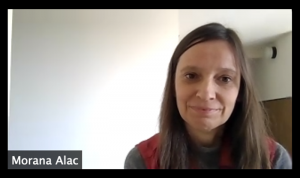 Morana Alac
Morana Alac
Associate Professor of Communications and Science Studies
UC San Diego
Morana’s main research interest is in our relationship with the world, which she engages by paying attention to embodiment, the dynamics of multimodal interaction, materiality and the senses. In doing so, she borrows from interpretative semiotics, distributed cognition, and ethnomethodology.
What work do you hope comes out of your collaboration with the research group?
I hope that what we do will prevent, even if slightly, a return to the world that we knew before the coronavirus. In terms of the project, I would like to think about the idea of artificial humanity by focusing on two phenomena that have been in the news during the pandemic. The first concerns how news outlets report on anosmia (the loss of the sense of smell) as one of the symptoms of COVID-19 (I may also do some interviews with people who recovered from COVID-19). The second question I’d like to pursue is how COVID-19 has generated imaginaries on the potential role of robotics in public health emergencies, a topic that is closely related to Gaby’s discussion of the use of robots during radiation accidents.
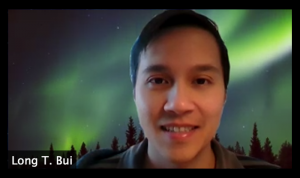 Long Bui
Long Bui
Assistant Professor of Global and International Studies
UC Irvine
In his work and in teaching, Long recognizes the organizing structural principles and social forces that connect us all across planetary networks. Recognizing the need to expand the public university’s reach into the local community, he is the official faculty adviser to the UC Irvine chapter of the Prison Education Project (PEP). In the School of Social Sciences, he is on the Curriculum Advisory Committee for the Diversity, Inclusion, & Racial Healing Ambassador Program (DIRHA), which teaches local high school students about race by bringing them to campus. Additionally, he is the faculty director of Summer Academic Enrichment Program (SAEP), a summer research-intensive program for first-generation social science majors who want to go to graduate school.
How are you navigating the experience of a virtual research collaboration with the RRG? What are the opportunities and challenges?
[The conditions of work during the] coronavirus give us room to think of the state of artificial humanity via telecommunications and the posthuman transmission of human knowledge. Remote videoconference allows for a new way of meeting as a research collaborative group. I love this virtual, digital way of doing things as we think across intellectual space together in different geographic locations.
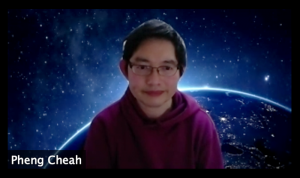 Pheng Cheah
Pheng Cheah
Professor of Rhetoric and Geography
UC Berkeley
Pheng has published extensively on the theory and practice of cosmopolitanism, and has taught at UC Berkeley since 1999. He is currently completing a book provisionally entitled Artificial Human Rights: Towards a Theory of Biopolitical Rights. The book explores the political crafting of material and intellectual human capacities, and its implications for understanding fundamental human rights.
What work do you hope comes out of your collaboration with the research group?
I’m not sure how this coronavirus project can be a group project since we all have different ideas and are approaching it from a different angle. I’m working on an article-length piece on how institutional practices and discourses of epidemiology and global public health in response to the pandemic rely on a notion of a natural course of conduct proper to humanity even as they problematize this notion. Ideas such as trans-species migration and zoonotic spillover partly draw on recent theoretical accounts of human/non-human sociality that fall under the rubric of the analysis of the anthropocene. But these theories are put into question by the practices in question.
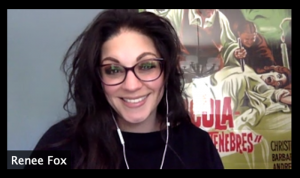 Renee Fox
Renee Fox
Assistant Professor of Literature
UC Santa Cruz
Renee’s research areas include nineteenth-century British literature and culture, Irish literature and culture from the nineteenth century to the present, the gothic, monsters, popular culture, adaptations and adaptation theory, and fantasy. She is currently finishing a book called Necromantic Victorians: Reanimation and the Historical Imagination in Nineteenth-Century British and Irish Literature, which investigates how writers use the figure of the reanimated body (mummies, speaking corpses, zombie metaphors, etc.) to consider both the possibilities and the dangerous limitations of a presentist historical sensibility. Necromantic Victorians includes two chapters that are especially relevant to the theme of this year’s RRG: one on Mary Shelley’s Frankenstein and its nineteenth-century adaptations that reverse engineers the cultural myth of Frankenstein as a novel about a dangerous reanimated corpse, and another on Charles Dickens’s Our Mutual Friend and its critique of the zombie-like mechanics of realist representation.
How are you navigating the experience of a virtual research collaboration with the RRG? What are the opportunities and challenges?
To be perfectly honest, I’m finding research in any form (collaborative or otherwise) next to impossible during the quarantine, so I’m probably not the best person to answer this one. I suspect we all feel like we’re doing the best we can to get to know each others’ ways of thinking and intellectual concerns under exhausting and anxious circumstances, but I also think we all know that most of us are not as intellectually present as we would usually be, and that there’s a certain chemistry that relies on in-person collaboration to flourish. To me, this latter point is actually a pretty useful thing to realize—we can make an online world work in the absence of a real world, but the two are by no means interchangeable.
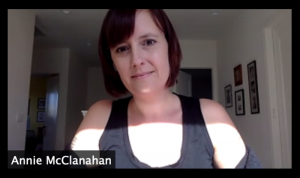 Annie McClanahan
Annie McClanahan
Associate Professor of English
UC Irvine
Annie’s first book, Dead Pledges: Debt, Crisis, and 21st Century Culture (2018), took up the way cultural objects from horror film to conceptual art responded to the 2008 credit crisis and the financialization of household debt that preceded it. Her current work explores the connection between automation and the rise of service work and gigwork, looking at issues ranging from the return piece-rate wages to the emergence of a global service precarious class.
How are you navigating the experience of a virtual research collaboration with the RRG? What are the opportunities and challenges?
I am finding research and writing in these times very difficult. Even though my research has always concerned the ever-shifting grounds of contemporary politics, economics, and culture, I find it uniquely hard to gain any scholarly distance on current conditions. Instead, it seems to me that we are writing “in the midst” of things, and I’m grateful to have comrades in that muddle through the RRG.
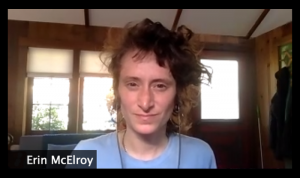 Erin McElroy
Erin McElroy
Postdoctoral Researcher
AI Now Institute, New York University
At the AI Now Institute at New York University, Erin’s research centers on the property technology industry as it is connected to new forms of surveillance and racial dispossession in gentrifying cities. Erin received their PhD in Feminist Studies at UC Santa Cruz for a project on race, technology, and the politics of displacement in postsocialist Romania and post-Cold War Silicon Valley. As cofounder of the Anti-Eviction Mapping Project and Radical Housing Journal, they prioritize producing collective knowledge for housing justice.
What work do you hope comes out of your collaboration with the research group?
I have been collaborating on a number of projects, such as the Anti-Eviction Mapping Project, that are addressing the rise in property surveillance, housing injustice, and threats to tenants in the wake of COVID-19, as well as emancipatory possibilities. I am excited about bringing these research interests into the RRG to think through them in interdisciplinary humanities contexts. I would like our collaborative project to continue to think through the uneven impacts and causes of the pandemic, particularly as they are racialized.
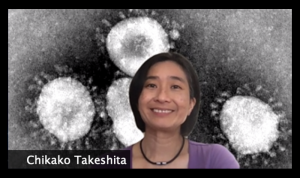 Chikako Takeshita
Chikako Takeshita
Associate Professor of Gender and Sexuality Studies
UC Riverside
Chikako’s research area is feminist studies of science, technology, and medicine with a focus on reproduction, biopolitics, and the gendered bodies. She is at work on a future project that will involve radiation toxicity in the context of the nuclear accident in Fukushima in 2011.
How are you navigating the experience of a virtual research collaboration with the RRG? What are the opportunities and challenges?
While quarantine in itself does not change my research trajectory, collaboration becomes more challenging without the face-to-face interactions and informal conversations that often contain sources of inspiration. We have yet to figure out what our final output will look like. [In a larger sense,] I would like to know if and how the new reality might affect each person’s area of research. What new considerations have to be made, or which existing theoretical approaches in your field meet the new conditions and where do they fall short?
